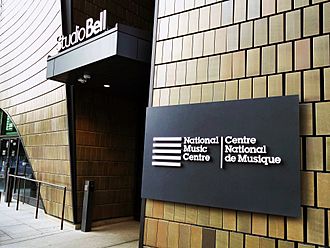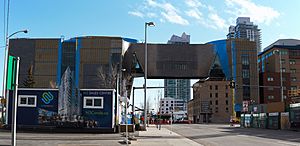National Music Centre facts for kids
Quick facts for kids National Music Centre |
|
|---|---|
|
Centre nationale de musique
|
|

Street entrance
|
|
| Alternative names | Studio Bell |
| General information | |
| Status | Complete |
| Type | Music Museum |
| Location | Calgary, Alberta |
| Coordinates | 51°02′43″N 114°03′18″W / 51.0453°N 114.0549°W |
| Construction started | 2013 |
| Completed | 2016 |
| Cost | $191 million |
| Owner | National Music Centre |
| Technical details | |
| Floor count | 5 |
| Floor area | 160,000 sq ft (15,000 m2) |
| Design and construction | |
| Architecture firm | Allied Works Architecture |
| Services engineer | SMP Engineering |
The National Music Centre (NMC) is a special place in Calgary, Alberta, Canada. It's like a museum, a concert hall, and a recording studio all in one! The main building is called Studio Bell. It's where you can explore the amazing world of music.
Contents
A Musical Journey: The History of Studio Bell
How It All Started
The idea for the National Music Centre began in 1987. This was when a large pipe organ was put into Calgary's Jack Singer Concert Hall. This organ was called the Carthy Organ.
Because of this organ, a group called Chinook Keyboard Centre started. They began collecting many different keyboard instruments in 1996. Soon, this group changed its name to Cantos Music Museum. They started collecting even more instruments, like electronic instruments and sound gear. They also began offering tours and concerts.
Moving to a New Home
In 2003, Cantos Music Museum moved into a historic building called Customs House. They offered more music programs there. In 2005, they had an exhibition about 100 years of music in Alberta. This made them want to celebrate and support Canadian music even more.
In February 2012, Cantos officially became the National Music Centre. The centre quickly grew too big for its space. So, plans were made to build a huge new building in Calgary's East Village.
Construction on the new building started on February 22, 2013. The final steel beam was put in place on December 12, 2014. The building cost $191 million to build. The National Music Centre closed its old location on December 28, 2014. This was so they could move everything to the new, bigger centre.
Studio Bell Opens Its Doors
The National Music Centre's new home, Studio Bell, opened on Canada Day, July 1, 2016. About 5,600 people came to the grand opening! Famous musicians like Jim Cuddy from Blue Rodeo and Alan Doyle from Great Big Sea performed.
Studio Bell is a fantastic place to visit. It has over 2,000 rare instruments and special items. These include the Rolling Stones Mobile Studio and the famous TONTO synthesizer. You can also see one of Elton John's pianos! The building also houses the Canadian Music Hall of Fame and the Canadian Country Music Hall of Fame.
The inside of Studio Bell is covered with 226,000 special terracotta tiles. These tiles were made in Germany and fired in the Netherlands. A company called Bell Canada paid $10 million for the centre to be named "Studio Bell" for 12 years.
What You Can Do at Studio Bell
Studio Bell offers many exciting things to do. You can enjoy interactive education programs. They also help new artists grow and perform. There are exhibitions and concerts every day. They even have a program where artists can live and create music there.
The centre has broadcast facilities for the CKUA Radio Network. It also has a concert hall that seats 300 people. Many events have been held there, including one of The Tragically Hip's last concerts.
A special part of the centre is the historic King Edward Hotel. This hotel was carefully taken apart and rebuilt right inside Studio Bell. It now works as a live music venue seven nights a week.
Studio Bell also has a top-notch recording studio. It has three control rooms and three live rooms. The centre keeps its musical instruments and equipment in perfect working order. This means artists can use old and rare instruments to record new music. They can experiment with instruments from a 400-year-old harpsichord to TONTO. TONTO was the first and largest multitimbral polyphonic analog synthesizer ever made!
See also
- List of music museums


